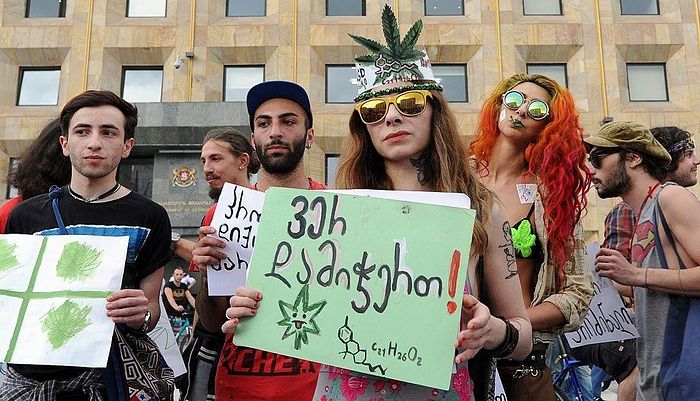The Holy Synod of the Georgian Orthodox Church had recently spoken out against the possibility of legalizing the drug.
Tbilisi, August 1, 2018
 Activists gather during a rally in support of marijuana legalization in central Tbilisi, Georgia, on June 2, 2015. VANO SHLAMOV/AFP/GETTY IMAGES
Activists gather during a rally in support of marijuana legalization in central Tbilisi, Georgia, on June 2, 2015. VANO SHLAMOV/AFP/GETTY IMAGES The Constitutional Court of Georgia ruled on Monday that marijuana use is “an action protected by the right to free personality,” removing all administrative punishments connected with consumption of the drug.
Criminal punishments for cannabis use had already been abolished eight months prior, though administrative punishments such as fines had been retained at that time, reports oc-media.org.
The Georgian Orthodox Church has called for leniency towards marijuana users, advocating for treatment programs, though it has opposed the legalization of marijuana use. Patriarchate representative Archpriest Andrei Dzhagmaidze has called the court’s decision a national betrayal.
Marijuana advocates are hailing the court’s decision as a victory for “freedom.” “This wasn't a fight for cannabis. This was a fight for freedom,” said Zurab Japaridze, one of the two men who initiated the proceedings, according to Radio Free Europe.
However, not everyone even in the secular world is celebrating. “I do not agree with the decision of the Constitutional Court,” said Akaki Zoidze, chair of the healthcare committee in Georgia’s parliament, according to Newsweek. “Marijuana consumption should be allowed only for medical purposes…our aim was not to make marijuana accessible for everyone but to reduce the number of drug-addicts.”
The four senior court judges who handed down the ruling reasoned that marijuana use harms only the user himself, and thus he takes on the responsibility as a free person. “The consumption of marijuana is not an act of social threat. In particular, it can only harm the user's health, making that user him/herself responsible for the outcome. The responsibility for such actions does not cause dangerous consequences for the public,” the court said.
However, in cases where third parties may be harmed, such as when the drug is smoked in schools and public places and in the presence of children, legal responsibility will still be incurred.
Furthermore, the cultivation and sale of marijuana remains illegal.
However, as the Holy Synod of the Georgian Church argued in June, the legalization of marijuana use is a gateway to the legalization of cultivation. “In the end, all of this creates a basis for the legal cultivation of marijuana in Georgia, which is completely unacceptable,” the minutes of the bishops’ session read.
The Synod also noted that “permission to produce cannabis really means the legalization of drug trafficking, which will bring severe consequences to the country.”
“The decision to legalize marijuana is nothing other than a betrayal of the nation,” Fr. Andrei Dzhagmaidze has commented.
“It is impossible for four people who are judges of the Constitutional Court to make a completely illogical decision, ignoring the will of a four-million-strong nation. I think that such a Constitutional Court should be abolished in general,” said the Church representative.
The hierarchs of the Georgian Church have previously called on the state to take a number of concrete steps, such as establishing special rehabilitation centers for people who are dependent upon drugs, actively including the media in a campaign to promote healthy lifestyles and change the public opinion regarding drug use, and introducing a special training course in schools to explain to children and adolescents how dangerous drugs are for their health.
Follow us on Facebook!



